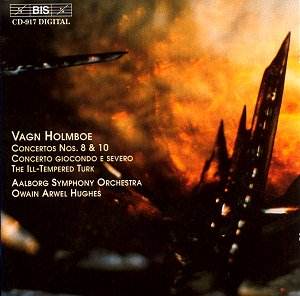Another Holmboe disc from Bis is always welcome.
Here we have three works from the insular mid-1940s and one from
the international years of the 1970s. These three chamber concertos
have in common that they do not feature solo parts - unlike the
other ten. There are thirteen of these Holmboe concertos if you
include the 1977 Concerto Giocondo e Severo.
The Eighth is in two movements characterised
by strongly rhythmic writing and with Holmboe's rhythmically thudding
figures much in evidence. Similar epic stomps can be found in
Hilding Rosenberg's Third Symphony. Holmboe avoids the 'modernism'
of dodecaphony instead deploying a language that is an extrusion
of and evolution from Nielsen's writing in the Fifth Symphony.
This meshes with the sort of string writing we find in Tippett's
works of the 1930s and 1940s. The Tenth Concerto is in
nine episodes (each banded separately). Much of it is sanguine,
celebratory, never trite and as full of intriguing detail as a
Dutilleux score. The Op. 132 Concerto is for a much larger
orchestra than the other two although, as usual, Holmboe makes
restrained rather than epicurean use of it. The work is no longer
than a standard concert overture. Once again the Holmboe characteristic
of shuddering impacts seeming to release blossoming fields of
flowers (e.g. 6.03) is in evidence along with a truly symphonic
nobility. In its antiphonal clashes this recalls Arnold Rosner's
prelude to The Chronicle of Nine.
During the years of the Nazi occupation of Denmark
Holmboe wrote a complete ballet to the 1001 Nights tale 'The Ill-Tempered
Turk' by Alex Salto (1889-1961). The Arabian fantasy theme was
not exactly alien to Danish culture; witness Nielsen's music to
Oehlenschlager's 'Aladdin'. In 1969 Holmboe produced a five movement
suite from the Den Galsindede Tyrk music he had
written between 1942 and 1944. The music includes the black-hearted
squealing and stamping of The Dance of the Executioner,
the Dance of the two spirits - a twilight stroll evolving
into slamming splendour, the cool pan-pipe soliloquy of Dance
of the Trees (like Rosenberg), the violent dissonant Sword
dance of the sultan and the Dance of folks and warriors
with its skirling woodwind - part-Celtic and part-Hungarian. There
are no Rimskian touches in this - nothing with an Oriental sway.
The ballet has never been performed. I hope that Bis have pencilled
it in to record the original score complete.
Another valuable Holmboe collection from Bis.
Not necessarily the place to start your Holmboe collection (the
symphonies 4-6 fit that bill) but those who have already tried
and liked the music of this Danish master will want to add these
works to their 'singing in the bath' repertoire.
Rob Barnett
